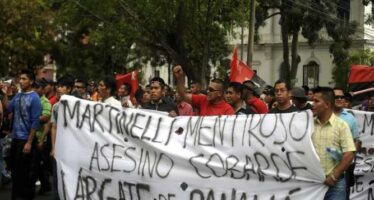Karzai sets up body for peace talks
![]()
Karzai sets up body for peace talks
Afghan president announces 68-member ‘high council for peace’ for holding talks with Taliban and other armed groups.
Hamid Karzai, the Afghan president, has appointed a high-level peace council to hold talks with the Taliban.
“Today we will announce the list of the high peace council members,” Karzai said during a ceremony marking Afghanistan’s national literacy day, on Tuesday.
His office later released a list of 68 people hand-picked by Karzai to lead his efforts to broker a peace deal with Taliban and other anti-government fighters.
The list includes former president and warlord Burhanuddin Rabani, warlords Abdul Rab Rasoul Sayaf and Haji Mohammad Mohaqiq, all key figures in the resistance during the 1996-2001 Taliban rule over the country.
These commanders helped the United States and other Western allies topple the Taliban from power in late 2001.
Dozens of pro-government religious leaders, former government officials and tribal elders are also part of the new council, along with at least seven women, Waheed Omer, Karzai’s spokesman, said.
Officials said the council would include former members of the Taliban and Hizb-i-Islami, a minor armed group led by Gulbuddin Hekmatyar, a former prime minister and mujahedeen leader.
Hizb-i-Islami is currently in a tenuous alliance with the Taliban, although both sides remain suspicious of each other.
“This council is mandated to broker peace through negotiation and reconciliation” with the Taliban, Omer said.
“The mandate given to the high council for peace is a big mandate. The government will respect their mandate.”
‘Eyebrows raised’
But Sue Turton, Al Jazeera’s correspondent reporting from the Afghan capital, Kabul, said the list has raised a few eyebrows in Afghanistan because a number of the names are “ex-Jihadi, ex-northern allience leaders”.
“These people were still fighting the Taliban up until 2001, so the question is will that stop some of the more moderate members of the Taliban from coming to the negotiating table,” she said.
“The creation of the council is actually an initiative that came out of the “peace jirga” in Kabul in June [attended by community, tribal, religious and political leaders from across the country].”
Karzai has been pushing to open a dialogue with the Taliban leadership aimed at bringing an end to the war heading into its 10th year, but the Taliban have rejected talks unless Nato-led foreign forces withdraw from the country.
Karzai’s tearful plea
Karzai renewed his call on Tuesday for the Taliban to stop fighting and join the peace process, in an emotional speech in which he broke down crying.
“I have pain in my heart,” Karzai said, his eyes red with tears.
“I’m afraid that my son, my own son will become a refugee one day. Please, I don’t want my son and your son to be a foreign citizen. I want him to grow up here … I want him to serve his nation,” he said.
His impassioned speech came the same day Mohammad Kazim Allahyar, the deputy governor of the eastern Ghazni province, was killed in a suicide bombing along with his son, nephew and three bodyguards.
Meanwhile, also on Tuesday, residents fleeing the village of Masamud, in the country’s northeastern Laghman province, told Al Jazeera that Nato forces had killed 13 civilians and wounded eight others in a night-time raid on Sunday.
Nato said that its forces killed 30 anti-government fighters and one civilian during the raid, which took place in the province’s Alisheng district. Karzai’s office is reportedly investigating the incident.
Related Articles
Egypt clashes continue into third day as army cracks down
![]()
Outrage over abuse of women targeted in Tahrir Square as 10 people die and 441 are wounded in latest violenceAssociated
Afghanistan: War crimes investigations crucial to any security pact with USA
![]()
Afghan policemen stand guard near the premises where the forthcoming Loya Jirga will be held in Kabul. © MASSOUD HOSSAINI/AFP/Getty
A propósito de la reciente demanda contra Panamá ante el CIADI: breves apuntes
![]()
El pasado 15 de abril, se registró formalmente ante el Centro Internacional de Arreglo de Disputas entre Inversionista Extranjero y Estado (CIADI) una nueva demanda contra Panamá



